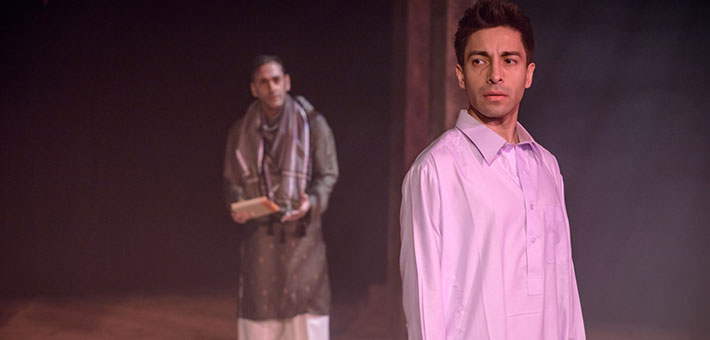Shaista Latif discusses Kawa Ada’s new play, The Wanderers, in connection with her own story of migration and adaptation.
We’ve all heard of the classic immigrant story. You know the one I’m talking about?
A family from a war torn country arrives in Canada with nothing more than a suitcase and a dream to succeed. This family, like many other families from similar war torn nations, chooses to make big sacrifices for a chance at peace, away from the guns, the bombs and the grenades. But what if peace is not possible for this family? What if war is the only way for them to connect and to exist? And what if war is part of their ancestry? Part of their lineage? Their legacy?
War is part of my ancestry as an Afghan. I understood the necessity of The Wanderers and the power of Kawa’s words. His play is a complicated piece of theatre. It is muscular, violent, poetic and unnerving. It stays true to the age old adage that art should comfort the disturbed and disturb the comfortable. When I was asked by Cahoots Theatre Company to assistant direct the production I accepted without a moment’s hesitation.
I met Kawa Ada in the spring of 2013. I had reached out to him via email when I found out about The Wanderers premiere at Buddies. I did so with urgency and excitement. I had never met someone like me. Someone who was queer, Afghan, Canadian, playwright and actor. A mouthful. We corresponded frequently through email for a couple of weeks before meeting in person. He invited me to be his special guest for a Cahoots Theatre Company brunch at their studio. A kind gesture. I accepted quite nervously, afraid of disappointment. I wondered if he would be able to recognize the Afghan in me. Most importantly, would I recognize the Afghan in him?
He greeted me with a big smile and a warm hug at the studio. It was nice to meet the man who could potentially understand and lessen my sense of loneliness. As the brunch continued with the passing down of muffin baskets and bread, Kawa and I exchanged stories at a furious speed. We were both aware of the bubble we had created in the short span of time and were afraid of it being burst. As we continued to talk about families, displacement and Scarborough, I noticed his polite tilted nods of agreement, his small graceful hand gestures, and genuine smiles. He asked of my comfort and cravings and if I needed anything to eat or drink every 5 minutes or so. By then, it was apparent that he was quite Afghan and I had found a confidant and mentor.
My relationship with the play has grown with time. And yes there have been moments when I have felt uncomfortable about the themes of mental illness and trauma the play presents but I know why. I have seen my own family struggle with displacement and adaptation. It has taken a toll on their mental health. For children of immigrants, we are the reason our parents fought to survive against all odds to be here. In Canada or elsewhere. Anywhere but “Home.”So when we disappoint our family and don’t live up to our legacy, we face great opposition and divide. This is brilliantly demonstrated in Kawa’s play with the tense father son relationship between Roshan and Aman.
The play has also provided me with a better understanding of Afghanistan’s history and its cyclical nature. The country has seen decades upon decades of war. Other than a small period of peace and modernization for 50 years, the Afghans have fought hard to salvage and protect the culture for hundreds of years. Did you know that the land itself has been fought over for nearly 5,000 years? It has seen its share of trauma and it has been heavily influenced by greater dominate powers from bordering nations and beyond.
So when I am asked if there will ever be peace in Afghanistan, my answer will always be the same. No there will never be peace. This is not a negative answer. It’s simply a fact. War has always been part of the landscape and to expect anything else will only deceive you. However, there is possibility of peace within the hearts of the Afghan people. Our bodies and minds may have been riddled with the trauma of past histories but we can overcome our grief and dissonance. How you ask? Well you begin with a story about a family who arrives to Canada with nothing more than a suitcase.
A (Brief) History of Afghanistan by Shaita Latif
The Wanderers is on at Buddies until March 23. You can visit the show page for more details.
image by Dahlia Katz.


